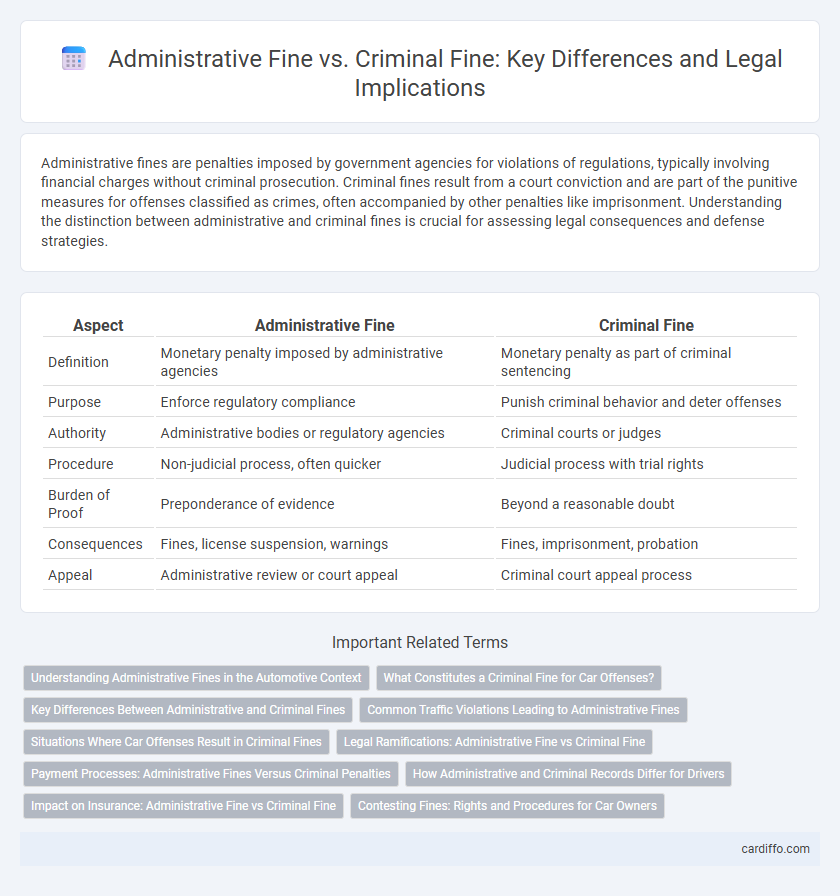Administrative fines are penalties imposed by government agencies for violations of regulations, typically involving financial charges without criminal prosecution. Criminal fines result from a court conviction and are part of the punitive measures for offenses classified as crimes, often accompanied by other penalties like imprisonment. Understanding the distinction between administrative and criminal fines is crucial for assessing legal consequences and defense strategies.
Table of Comparison
| Aspect | Administrative Fine | Criminal Fine |
|---|---|---|
| Definition | Monetary penalty imposed by administrative agencies | Monetary penalty as part of criminal sentencing |
| Purpose | Enforce regulatory compliance | Punish criminal behavior and deter offenses |
| Authority | Administrative bodies or regulatory agencies | Criminal courts or judges |
| Procedure | Non-judicial process, often quicker | Judicial process with trial rights |
| Burden of Proof | Preponderance of evidence | Beyond a reasonable doubt |
| Consequences | Fines, license suspension, warnings | Fines, imprisonment, probation |
| Appeal | Administrative review or court appeal | Criminal court appeal process |
Understanding Administrative Fines in the Automotive Context
Administrative fines in the automotive context are non-criminal penalties imposed for violations such as parking infractions, emissions breaches, or license irregularities. These fines are typically issued by regulatory agencies and do not result in a criminal record, focusing instead on compliance and corrective actions. Unlike criminal fines, administrative fines prioritize regulatory enforcement to maintain safety and environmental standards within the automotive industry.
What Constitutes a Criminal Fine for Car Offenses?
A criminal fine for car offenses is imposed as part of a legal penalty following a conviction for violations such as reckless driving, DUI, or vehicular manslaughter, reflecting the severity of the offense. These fines are set by criminal courts and often accompany other penalties like jail time or license suspension, distinguishing them from administrative fines that address regulatory infractions. The amount of a criminal fine depends on jurisdictional laws and the nature of the offense, emphasizing deterrence and punishment in the criminal justice system.
Key Differences Between Administrative and Criminal Fines
Administrative fines are penalties imposed by government agencies for regulatory violations without involving a criminal court, typically focused on enforcement of rules and compliance within sectors like environmental protection or business licensing. Criminal fines arise from court judgments following criminal prosecutions and serve as punishment for offenses such as theft or fraud, often accompanied by other penalties like imprisonment. Key differences include the burden of proof, with administrative fines requiring a lower standard and absence of criminal records, whereas criminal fines demand proof beyond reasonable doubt and result in a criminal conviction.
Common Traffic Violations Leading to Administrative Fines
Common traffic violations leading to administrative fines include speeding, running red lights, and illegal parking, which are typically resolved through payment rather than court appearances. These fines are imposed by administrative agencies to enforce traffic laws and maintain road safety without criminal prosecution. Unlike criminal fines, administrative fines do not result in a criminal record but may lead to penalties such as license suspension or increased insurance premiums.
Situations Where Car Offenses Result in Criminal Fines
Car offenses such as drunk driving, hit and run incidents, and reckless driving often result in criminal fines due to their serious impact on public safety and legal accountability. Criminal fines in these cases are imposed alongside potential penalties like license suspension, imprisonment, or probation to deter dangerous behavior and ensure compliance with traffic laws. Unlike administrative fines, which typically address minor infractions like parking violations, criminal fines carry greater legal consequences and are recorded on the offender's criminal record.
Legal Ramifications: Administrative Fine vs Criminal Fine
Administrative fines impose monetary penalties for regulatory violations without criminal charges, aimed at enforcing compliance and deterring minor infractions. Criminal fines result from convictions in criminal cases, often accompanied by additional penalties such as imprisonment or probation, reflecting more severe legal consequences. The legal ramifications differ significantly, with administrative fines typically lacking a criminal record impact, whereas criminal fines contribute to a defendant's permanent criminal history.
Payment Processes: Administrative Fines Versus Criminal Penalties
Administrative fines typically require payment within a specified timeframe, often allowing installments or online payment options, streamlining the resolution process. Criminal fines, imposed following a court conviction, usually involve stricter payment conditions, including potential late fees, wage garnishments, or asset seizures if unpaid. The enforcement mechanisms for criminal penalties are more rigorous and can involve additional legal consequences beyond the financial obligation.
How Administrative and Criminal Records Differ for Drivers
Administrative fines for drivers typically result from traffic violations and are recorded on the administrative driving record, impacting license status and insurance rates without a criminal conviction. Criminal fines arise from traffic-related offenses such as DUI or reckless driving, appearing on the criminal record and potentially leading to harsher penalties including jail time. The key distinction lies in administrative records affecting driving privileges, while criminal records influence broader legal consequences and background checks.
Impact on Insurance: Administrative Fine vs Criminal Fine
Administrative fines typically result in less severe consequences for insurance premiums, as they are considered regulatory penalties and do not imply criminal liability. Criminal fines, however, often lead to significant increases in insurance costs due to the association with criminal activity and higher perceived risk. Insurers assess criminal fines as indicators of higher risk profiles, which adversely impact insurance eligibility and pricing.
Contesting Fines: Rights and Procedures for Car Owners
Car owners contesting administrative fines must file an appeal within a specified period, typically 15 to 30 days, through the relevant traffic authority or administrative body. Criminal fines involve court proceedings where defendants have the right to legal representation, present evidence, and request a hearing before a judge. Understanding procedural deadlines and evidence requirements is crucial for effectively challenging fines in both administrative and criminal contexts.
Administrative fine vs criminal fine Infographic

 cardiffo.com
cardiffo.com